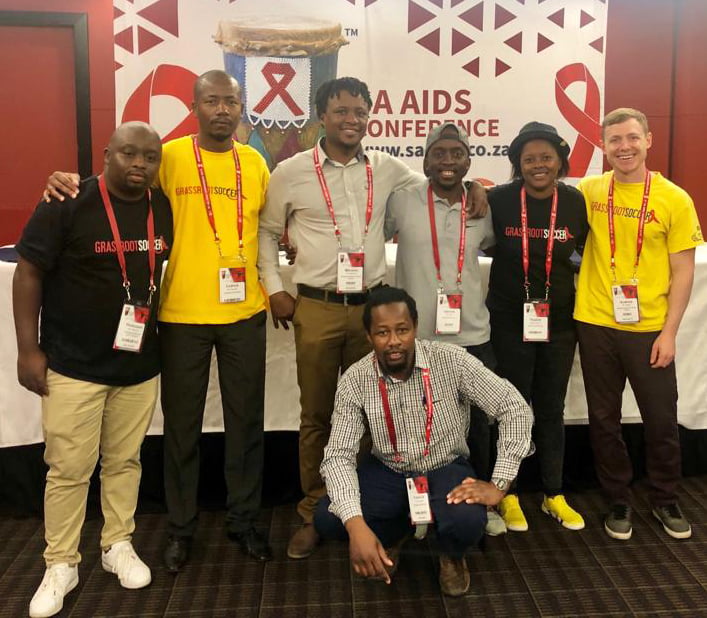Grassroot Soccer at SA AIDS: Talking Points and Takeaways

Grassroot Soccer staff assemble on the first day of the biannual SA AIDS Conference, held in Durban.
It was with great excitement that Grassroot Soccer (GRS) joined thought leaders, scientists, medical practitioners, and influential stakeholders for the ninth-annual SA AIDS Conference in Durban. The biannual conference is the second-largest HIV conference in the world and brings together more than 3,000 people, 25% of whom represent countries other than South Africa. During our time at the conference, GRS had the privilege of sharing two poster presentations.
The first poster evaluated our sport-based model for demand creation alongside Special Olympics South Africa (SOSA) to provide Sexual and Reproductive Health and Rights (SRHR) knowledge to young people with intellectual disabilities.
More than 7.1 million South Africans are living with HIV – prevalence among the general population is approximately 19%. People with intellectual disabilities are especially vulnerable to HIV infection, experience a higher risk of violence, and are subjected to numerous types of discrimination. They often have limited access to information, education and health services, and are largely excluded from HIV prevention and sexual and reproductive health and rights programs. SOSA and GRS designed and implemented a sport-based health and life skills program, supported by the South African National Lottery Commission, to address priority needs of this population in South Africa. SKILLZ for Life (SfL) aims to build the assets of youth ages 8-30 with intellectual disabilities, providing them with HIV, SRHR and life skills information and the confidence to use it, while also increasing access to and utilization of health services. SfL also aims to increase adherence of young people to medical treatment, therapy and healthy behaviors.

Evaluation of SKILLZ for Life in South Africa: a poster presentation of GRS’s collaboration with AHF Southern Africa.
Our second poster presentation highlighted our collaboration with AHF Southern Africa to provide adherence support to adolescents living with HIV. Adolescents and young people face a range of health challenges, including barriers to accessing HIV-related services. UNAIDS has presented the ambitious Fast Track targets of 95% of people living with HIV knowing their HIV status, 95% of people who know their status receiving treatment, and 95% of people on HIV treatment having a suppressed viral load by 2030. Adolescents play a key role in achieving 95-95-95, as an estimated 50% of new HIV infections globally occur among ages 15-24, making it a priority population for behavioral and biomedical interventions.
The GRS model shows promise as a demand creation strategy for adolescent uptake of HIV-related services, making a contribution to the first 95 in the 95- 95-95 cascade. GRS results demonstrate that sport-based interventions can strengthen the adolescent prevention and treatment cascade and contribute to the global HIV response by creating access to this target population.
Reflecting upon his experience at SA AIDS, GRS Partnerships Assistant and Master Trainer Dennis Dube offered the following key takeaways:
Youth are our future. “In one of the presentations it was highlighted that as we try to control the HIV epidemic, it’s important to equally engage men and young boys. I think this is a space that Grassroot Soccer plays a big role in as we engage adolescents boys in SKILLZ Guyz/SKILLZ Boyz and adolescent girls in SKILLZ Girl.”
Know your audience. “A number of presenters mentioned the importance of designing programs which have age-appropriate content and the importance of following up with participants through ongoing age appropriate content.”
Equality vs. equity. “One challenge that was highlighted is that most of the time equality vs equity is not taken into consideration when designing programs. This plays a role in the spread of HIV, as one sex would benefit from programs and the other sex won’t.
Consider the whole person. “With self-testing HIV kits, how can we make sure people are mentally ready? Mental health plays an important role in the fight against HIV, and the health of the whole person must be considered.”
Grassroot Soccer programs in Zambia, Zimbabwe and South Africa are implemented with the generous support of PEPFAR and USAID, among other generous supporters. GRS wishes to thank all funders, Coaches, partner organizations and participants.

